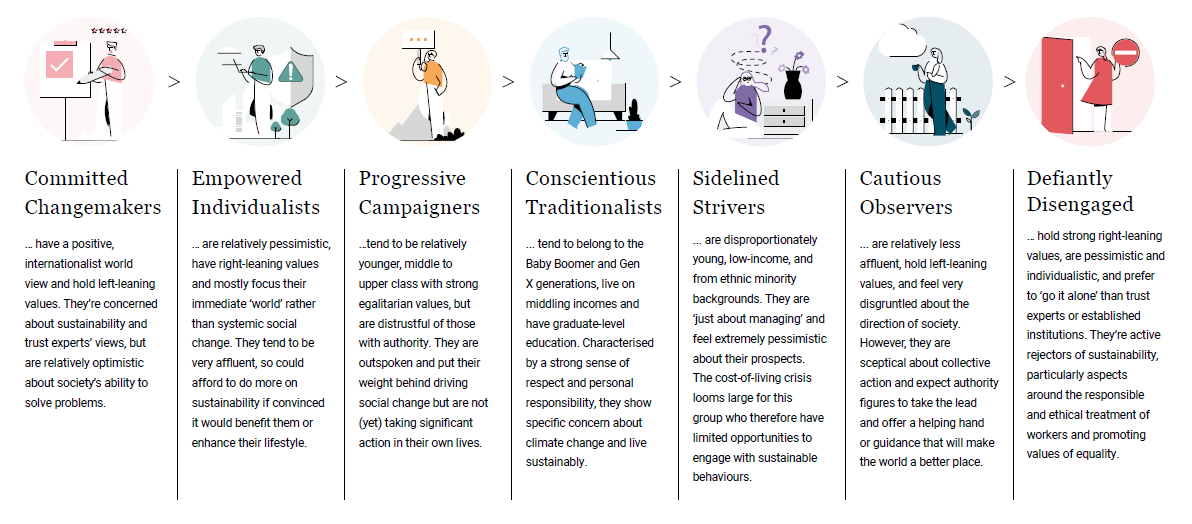
A third (30%) of individuals use petrol/diesel cars every day in the United States, with carbon emissions being the least important consideration when making purchasing decisions.
As crises become more and more immediate, sustainability is the culprit that gets pushed to the back of the agenda more and more frequently. With war, economic challenges, and the ever-changing landscapes of industry sectors, behavioral shifts have become a constant.
But ultimately, the world’s many problems pale compared to the existential threat that climate change holds against our communities.
Savanta’s 2022 Eco Segmentation studies how society is embracing, or resisting, a desire to meet sustainable goals, even during a deep and global economic crisis. For businesses to understand what choices consumers make and where they fall complacent for the sustainable alternative, they must first understand what values consumers hold dear and what intrinsic behaviors they possess.
Want to know more about your audience segments… download our free report here.
Our segmentation shows that in their intensions and actions towards sustainability, the public falls into seven segments; from Committed Changemakers who have a positive, internationalist world view and holds left-leaning values to the Defiantly Disengaged, those holding strong right-leaning values, who are pessimistic and individualistic and prefer to ‘go it alone’ than trust experts or established institutions.
The report breaks down consumer behaviors across sectors to determine where sustainable practices shift from intention to action. Big strides have been made to provide more sustainable ways of traveling, with electric and hybrid vehicles being at the forefront of innovative change. But to what extent are people actually making sustainable purchases towards cleaner travel?
The car is perhaps the most distinctive symbol of personal freedom, the linchpin of social and economic life in western societies, and for some an extension of our own personalities.
Download our infographic on sustainability surrounding Travel and transport here.
A third (30%) use petrol/diesel cars every day, and particularly in the US and Canada, cars are near-irreplaceable for travelling long distances. Personal cars as the mode of choice reflects consumers’ key priorities when it comes to deciding how to travel—cost, speed and comfort. In other words, convenience is king, with safety and journey distance top hygiene factors when deciding how to get around.
It is no surprise, then, that the journey towards emission-free transportation is long and winding. On the face of it, carbon emissions are the least important consideration overall. However, Committed Changemakers (45%) and Empowered Individualists (44%) are significantly more likely than all other segments to say it’s important criteria. Reflecting this, three in ten (30%) Empowered Individualists own an electric vehicle, rising to more than a third (37%) of Committed Changemakers.
In each segment bar one, over half would consider buying an electric car, with the Defiantly Disengaged (47%) very close behind too. Progressive Campaigners (71%) and Conscientious Traditionalists (62%) are the most likely. Some Sidelined Strivers (15%), the lowest income segment, already own one despite being least likely to consider carbon emissions (11%). Appetite for electric vehicles (EV’s) is transcending environmental values, and is perhaps one example in the realm of sustainability where it pays to be a status symbol.
More broadly, those living in urban areas are widely being encouraged to shift away from cars wholesale. Overall, at least a quarter have already taken certain steps to travel more sustainably—even if their main intention may be just to save money, or get in a bit of extra exercise. Steps include switching to cycling or walking when they would usually drive (27%)—rising considerably among Committed Changemakers (56%) and Empowered Individualists (44%)—and reducing the number of vehicles owned by their household (25%).
This may gain momentum with rising petrol prices. The low-income Sidelined Strivers are significantly less likely than all other segments to use cars daily (24%), and one in five (22%) have already reduced the number of vehicles they own, another example of how saving money and a more sustainable lifestyle are closely connected.
Whichever way sustainable travel evolves, our research suggests that cost and convenience will continue to be crucial.
Apart from value, quality, and price, what else is important to consumers overall? Find out more in our latest Sustainability Segmentation Report.
Notes:
The report is based on the findings of a survey of 12,016 adults aged 18+ in the United States (5,006), United Kingdom (5,005), and Canada (2,005). Data are weighted to be representative of age, gender, region and income/education (US and Canada) or social grade (UK).






